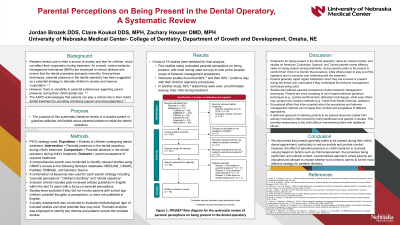Patient Management
304 - Parental Perceptions on Being Present in the Dental Operatory


Jordan Brozek, DDS
House Officer
University of Nebraska Medical Center
UNMC College of Dentistry
Omaha, Nebraska, United States- CK
Claire C. Koukol, DDS, MPH
Assistant Professor
University of Nebraska Medical Center
University of Nebraska Medical Center
Omaha, Nebraska, United States - ZH
Zachary L. Houser, DMD
Program Director
University of Nebraska Medical Center
Omaha, Nebraska, United States
Presenting Author(s)
Research Mentor(s)
Program Director(s)
Parental Perceptions on Being Present in the Dental Operatory
Brozek J, Houser Z, Koukol C
University of Nebraska Medical Center, Omaha, NE
Purpose: The purpose of this systematic literature review is to deduct the attitudes and beliefs currently held by guardians on watching their child’s dental procedures from inside the dental operatory.
Methods: To identify relevant studies, a comprehensive search was conducted using UNMC’s access to the following literature databases: MEDLINE, CINAHL, PsycINFO, EMBASE, and Dentistry Source. A combination of keywords including “parental perceptions” “children’s dentistry” and “dental operatory” was used for each search strategy. Inclusion criteria included peer-reviewed articles published in English within the last 15 years with a focus on parental perceptions. Studies were excluded if they did not involve parents with school age children or were not published in English. A quality assessment was conducted to evaluate methodological rigor of included studies and what potential bias may exist. Thematic analysis was employed to identify key themes and patterns across the included studies.
Results: PRISMA guidelines were used to identify a total of 19 studies for final analysis. Few studies solely evaluated parental perceptions on being present, with most having used surveys to look at the broader scope of behavior management acceptance. Studies found that 66 percent and then 69 percent prefer to stay with their child for operatory procedures. In another study, 50 percent stated they were uncomfortable leaving their child during any dental procedures.
Conclusions: We discovered there is a general preference among many parents to be present during their child’s dental appointment, particularly to reduce anxiety and provide comfort. However, the effect of parental presence on child’s behavior is nuanced, varying based on factors such as child temperament, the procedure being performed, and cultural context. A personalized approach, where parents are educated and allowed to choose whether to be present, seems to be the most effective strategy for pediatric dentistry.
Identify Supporting Agency and Grant Number:

.jpg)